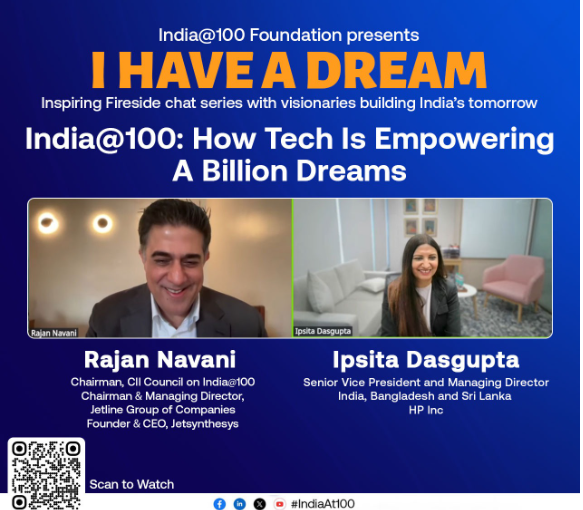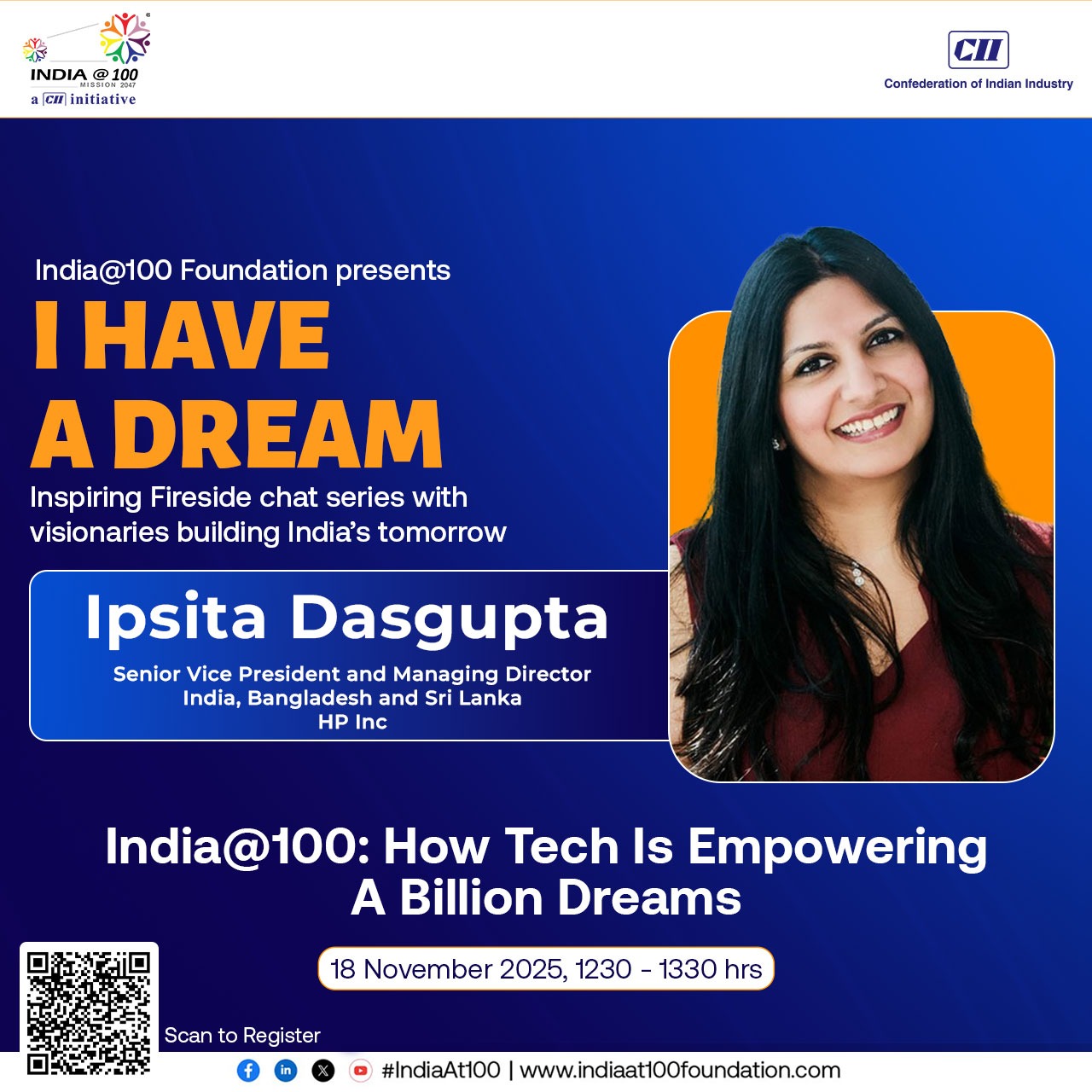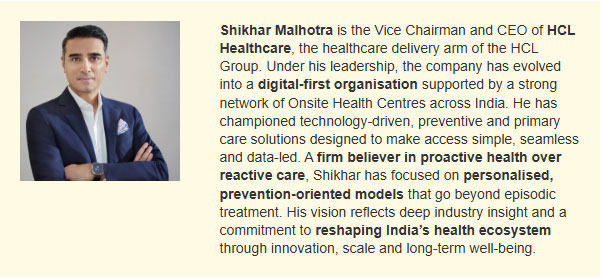
A Healthier Nation, A Stronger Economy: How Preventive Healthcare Drives India’s Viksit Bharat Vision 2047
As India accelerates towards its Viksit Bharat Vision 2047, aspiring to become a prosperous, developed nation, the role of a healthy workforce in shaping the future of its economy is undeniable. Preventive healthcare must be treated as a strategic investment in the nation’s future, not a discretionary expense.
India’s Workforce: The Engine of Economic Growth
India’s workforce is one of the largest and most dynamic globally, playing a crucial role in the country’s economic expansion. Yet this growing demographic faces significant health challenges. Lifestyle diseases, mental health issues and chronic conditions are eroding productivity and inflating healthcare costs. A 2023 study by HCL Healthcare of 56,000 corporate employees revealed that nearly two-thirds of the workforce suffered from elevated cholesterol, over 20% were obese, and a significant proportion were pre-diabetic or diabetic.
A 2022 Deloitte study estimated that Indian companies lose $14 billion annually due to poor mental health, manifested through absenteeism, reduced productivity and higher employee turnover. Furthermore, a 2021 WHO analysis found that for every $1 invested in employee mental-health interventions, organisations recoup $4 in improved health and productivity.
Together, these losses and returns underscore why preventive healthcare is foundational to economic resilience.
Building a Foundation for Long-Term Economic Success
Preventive health measures—early detection, proactive interventions and personalised wellness programmes—can dramatically reduce the burden of chronic disease while enhancing workforce engagement and retention. Healthy employees are more productive, incur fewer healthcare claims and help lower overall corporate spending on reactive treatment.
Transforming the Healthcare Landscape Integral to India’s Viksit Bharat Vision 2047 is the infusion of technology across all sectors, and healthcare is no exception. Innovations in artificial intelligence, data analytics and digital health solutions enable real-time monitoring, early detection and predictive health insights. AI-driven risk stratification allows employers to identify hypertension, stress or metabolic disorders long before complications arise.
Investment in health technology not only improves accessibility and quality of care for employees but also stimulates innovation and new economic opportunities. To fully harness these innovations, upskilling healthcare professionals in AI and emerging digital tools is essential. By equipping them with advanced capabilities, we can boost the efficiency of preventive programmes and improve national health outcomes.
Strategic Partnerships and Policy Incentives Beyond corporate initiatives, collaboration between government bodies, insurers and tech startups is crucial. Incentivising preventive checks through insurance-premium discounts or tax credits will accelerate employer adoption. Public–private partnerships can underwrite universal health screenings, while regulatory frameworks should prioritise data privacy and interoperability.
Addressing Social Determinants of Health Clinical measures alone are insufficient. Environmental and social factors—workplace ergonomics, indoor air quality and nutritious catering—must be addressed to maximise wellness. On-site air-filtration systems, healthy meal subsidies and safe commuting programmes work in concert with screenings to reinforce preventive care.
Monitoring Return on Investment Organisations should track both clinical and financial metrics. Key performance indicators might include reductions in absenteeism, declines in insurance claims and improvements in employee satisfaction scores.
To realise the Viksit Bharat Vision 2047, every employer and policymaker must prioritise preventive healthcare today. By combining technology, strategic partnerships and social-determinant interventions, India can unlock the full potential of its workforce and secure lasting economic prosperity.
The time to act is now.
INDEPENDENCE DAY SPECIAL
Har Ghar Tiranga 2025
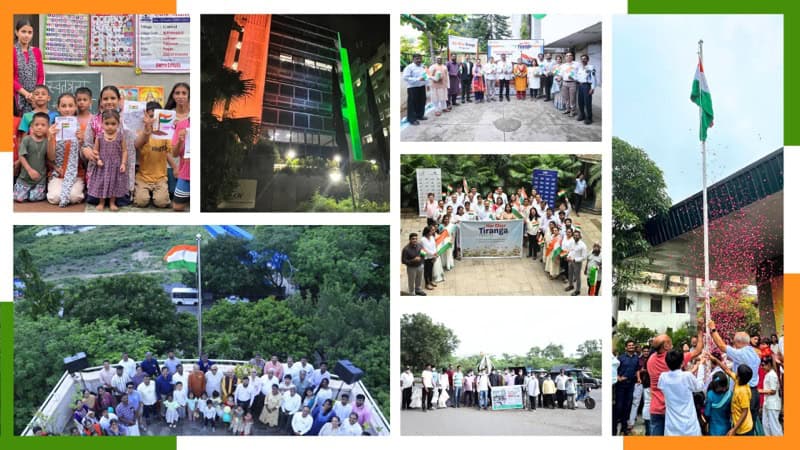
Under the aegis of Azadi Ka Amrit Mahotsav, the Ministry of Culture launched the Har Ghar Tiranga campaign to inspire citizens to hoist the Indian National Flag with pride at their homes and workplaces. CII members and staff marked India’s 79th Independence Day by supporting the Har Ghar Tiranga campaign. This initiative seeks to rekindle the spirit of patriotism and deepen awareness about the significance of the Indian National Flag.
The tricolour was proudly hoisted in offices and communities, while Tiranga Yatras, cultural performances, and themed competitions added colour, vibrancy, and a sense of shared pride to the occasion. Workplaces, homes, and public spaces came alive in the vibrant hues of the Tiranga, reflecting the collective joy of the celebrations.
The India@100 Foundation and associated civil society organizations further carried the festivities across the country—spreading a powerful message of national pride, unity, and hope as India marches towards 100 years of Independence.
Watch the video to hear from leadership voices supporting the campaign.
Watch the video
CONVERSATIONS
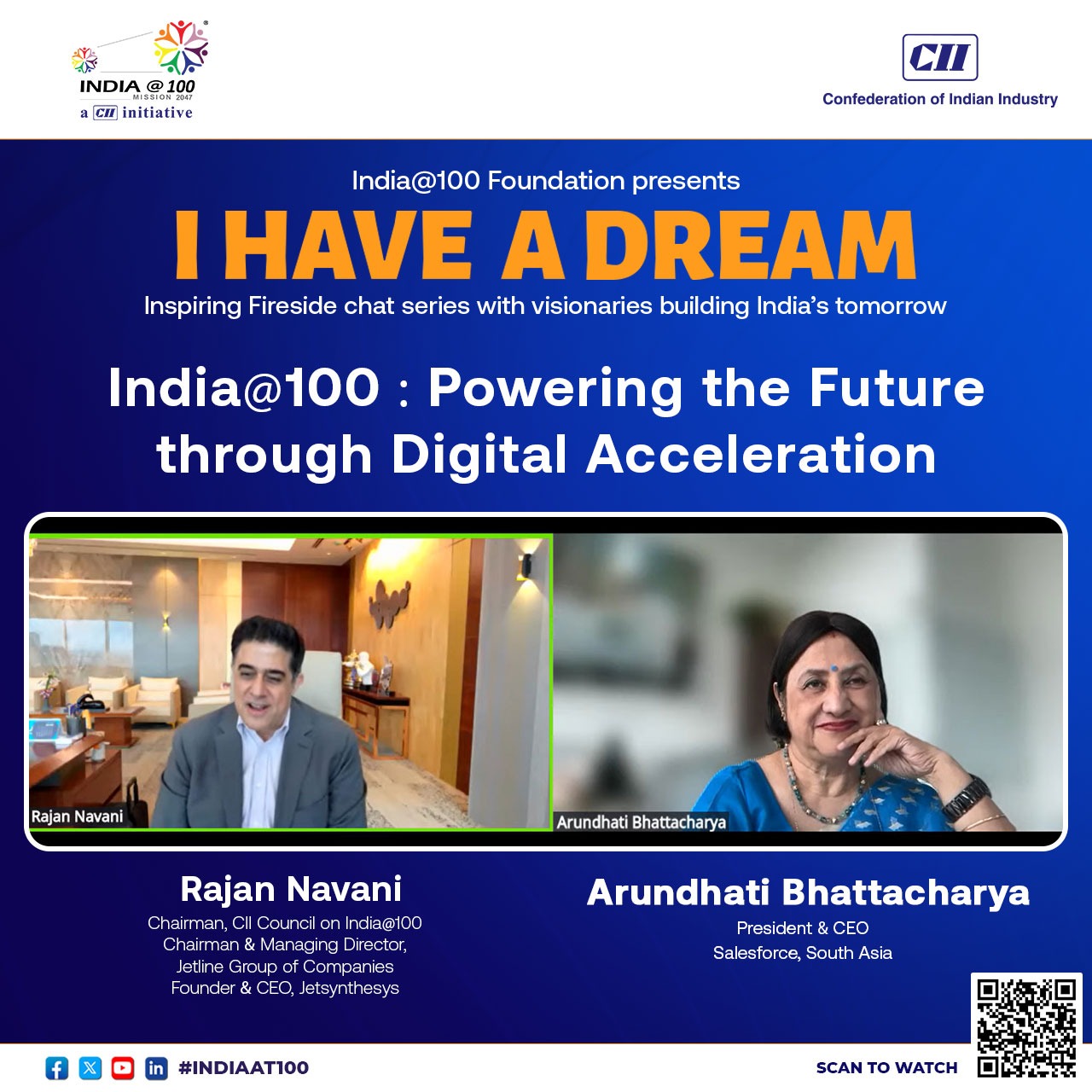
A fireside chat with Padma Shri Awardee Ms Arundhati Bhattacharya, President & CEO, Salesforce, South Asia, on India@100:Powering the Future through Digital Acceleration led to a rich and multi-faceted conversation.
The need for a bold, collaborative and technology-first approach to pursue the vision of India@100 cannot be overstated. India’s path to a resilient and future-ready digital economy must be anchored in digital inclusion—ensuring every citizen has equitable access to education, employment, and opportunity.
Importantly, India must work to be more than just a consumer of technology. Instead, it must position itself as a creator and aspire to global leadership across sunrise sectors such as space, pharmaceuticals, genetics, and defence. With its vast talent pool and digital-first society, India has the opportunity to emerge as a true knowledge and innovation powerhouse by 2047.
Watch the video
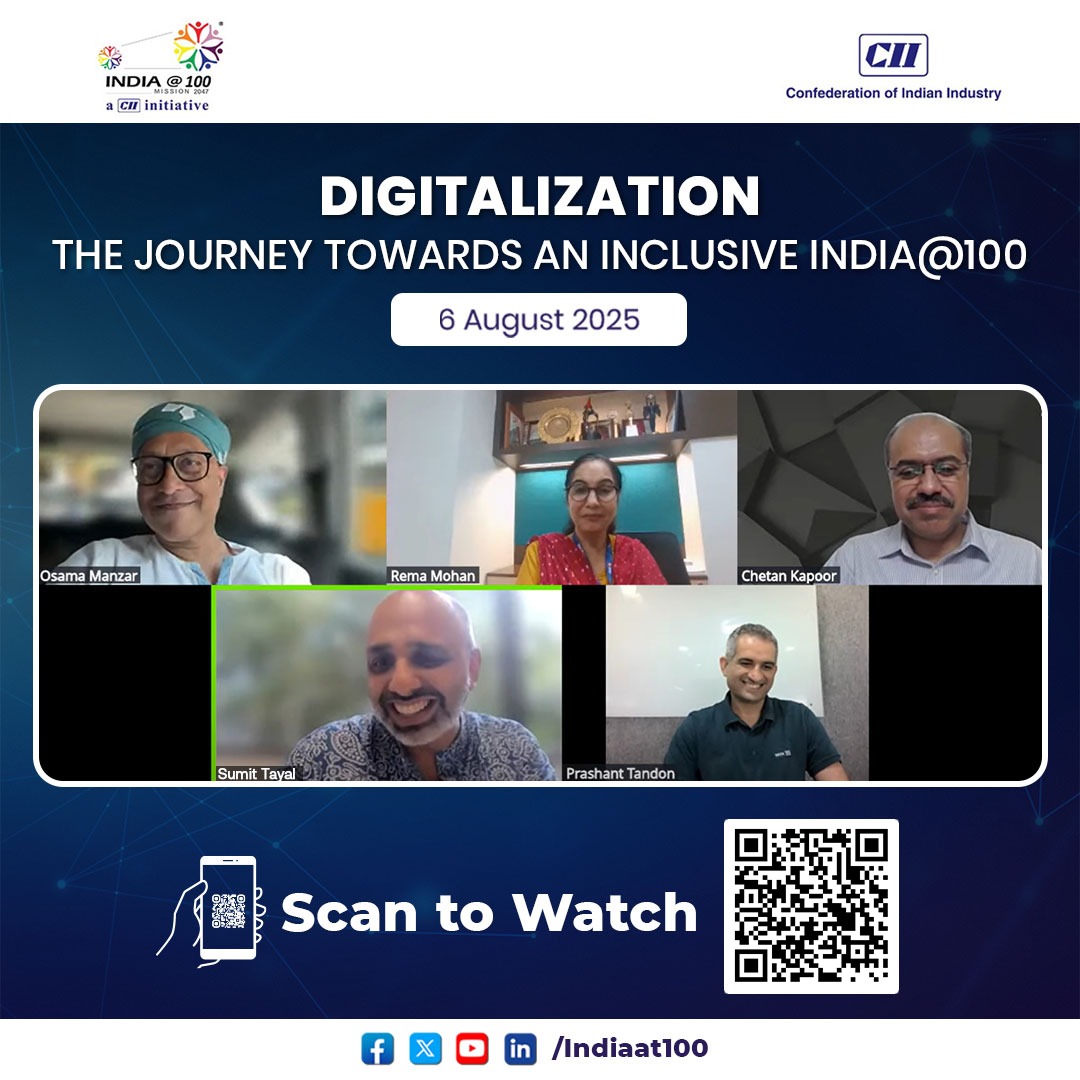
On August 6, 2025, the India@100 Foundation held an incisive discussion on how digital innovation can accelerate inclusive growth. A panel comprising experts in the field – Sumit Tayal, CEO, Give; Chetan Kapoor, CEO, Tech Mahindra Foundation; Rema Mohan, CEO, NSE Foundation; Prashant Tandon, CEO, TATA 1mg; and Osama Manzar, Founder & Director, Digital Empowerment Foundation – brought heft to the conversation.
It was felt that digitalisation must be inclusive, and it was important to ensure universal digital literacy regardless of location or income. The impact of this can be far-reaching—as AI democratises intelligence, innovations can emerge in small towns, especially those that are contextualised to the local situation. These innovations have the potential to address longstanding disparities in essential areas such as healthcare, education, and administration. Importantly, digital tools can empower underserved communities through financial independence and community participation.
The discussion strongly validated the premise for inclusive digitalisation – India’s pursuit of an equitable and prosperous society will truly gain momentum when every citizen has access to the power of technology.
Watch the video
THE JOURNEY THUS FAR
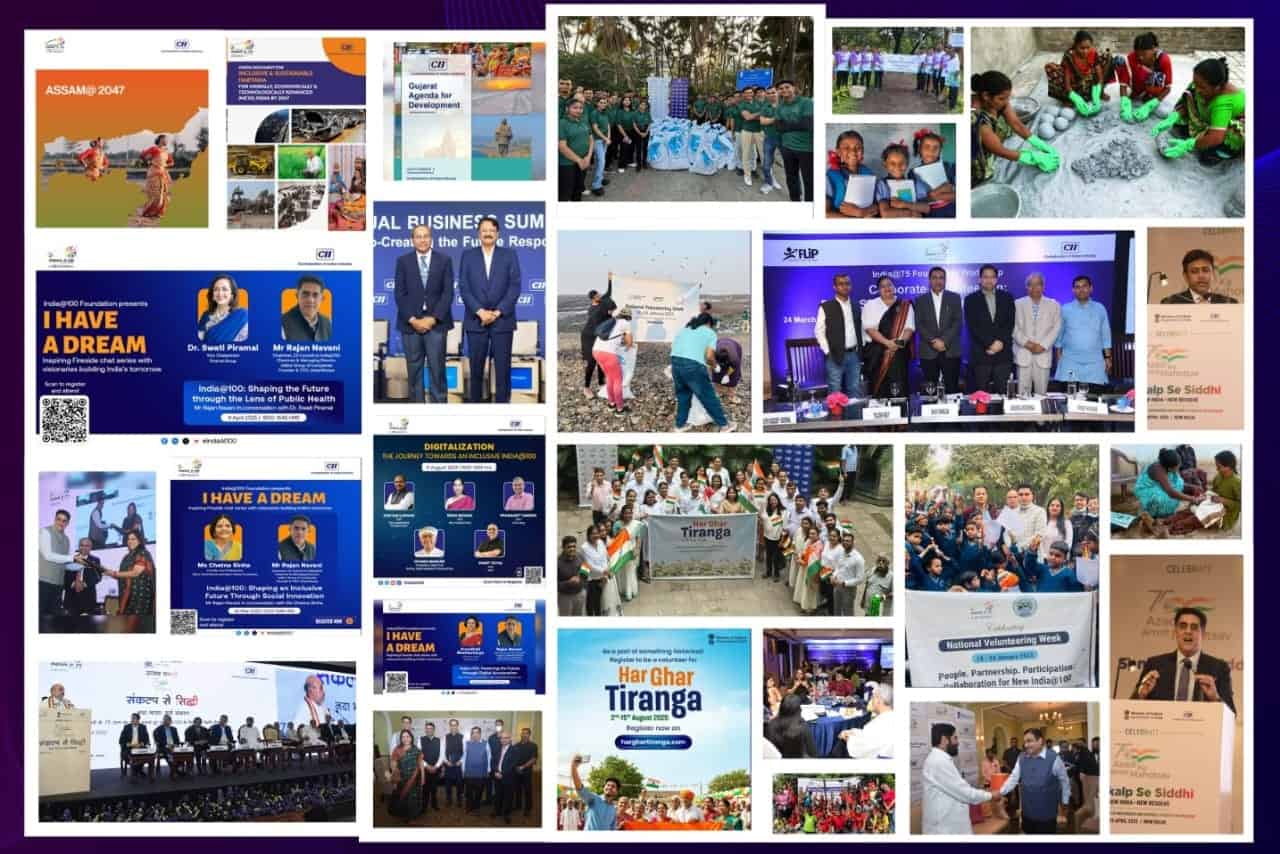
CII and the India@100 Foundation have developed the National Vision Document for India@100: The People’s Agenda to chart the nation’s aspirations for the next 25 years. The vision was shaped through an extensive and inclusive consultative process, engaging over 10,000 stakeholders directly and reaching 1.5 million citizens indirectly. This exercise included Sankalp Se Siddhi conferences, a national survey, interactions with industry leaders through fireside chats and panels, social media campaigns, and student-led competitions. The document reflects the collective aspirations of citizens and lays down a comprehensive roadmap for India’s journey towards 2047.
The India@100 movement, now housed in the India@100 Foundation, actively drives India’s development vision through dialogue and collaboration. It facilitates conversations among diverse stakeholders through the marquee I Have a Dream Fireside Chat series featuring industry leaders, thinkers, philanthropists, and motivational speakers. The Foundation has launched CHANGESPEAKE, a curated series highlighting individuals shaping an inclusive India@100, sharing inspiring stories and best practices to accelerate progress toward 2047.
The Foundation also fosters a strong culture of volunteering through the National Volunteering Week (NVW), which in its 12th edition engaged 135,356 volunteers, contributing 1,093,161 hours and benefiting over 32 million people across education, healthcare, climate action, rural development, women’s empowerment, and skill-building initiatives. Additionally, Initiatives like FLiP On Wheels, a mobile digital literacy programme to reach the doorstep of rural communities. The programme ran in Maharashtra, Madhya Pradesh, and Jharkhand, reaching over 5,500 people and making a strong case for scaling up.
The Foundation has also partnered with the government to strengthen the Har Ghar Tiranga (HGT) campaign, fostering a shared sense of responsibility and commitment toward realizing the vision of India@100.
For more details, visit https://indiaat100foundation.com/

